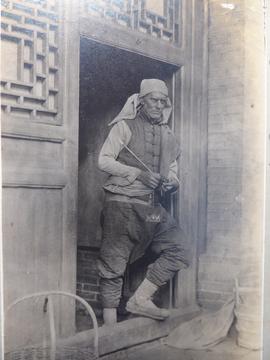- PRG
- Person
- 1656-1749
Showing 254 results
People & Organisations- PRI
- Person
- 1942-1969
The first (and only?) Indonesian palynologist, Dr Botjah Prijanto was born on the 1 April 1942 in Djombang, East Java. He studied at the College of Agricultural Sciences at Tjiawi, Bogor where he obtained his Batchelor degree in 1962 (taxonomy of flowering plants) and discovered a new species of Lancium (Meliaceae).
Prijanto then joined the Botany Division of the Forestry Research Institute in Bogor as Assistant Botanist before continuing his studies at the University of Edinburgh in 1963 under the supervision of Dr Peter H. Davies and Brian (Bill) L. Burtt. He submitted a thesis on the taxonomic problems of the Scrophulariaceae and was awarded the degree of Doctor of Philosophy in 1966.
Prijanto then spent a year in the Palynological Laboratory in Stockholm where he studied palynology under Prof. G. Erdtman.
In 1968 he was appointed Botanist at the Forest Research Institute in Bogor, regularly working in the Herbarium Bogoriense.
He travelled to many places in Indonesia on field trips, including Udjong Kulong, Sumbawa and South Sumatra. In 1969 he was collecting in South Celebes when he was tragically killed in a car accident.
(Reference, Reinwardtia, vol.8, 1970, pp.1-2)
- GB/NNAF/P165646
- Person
- 1880-1921
William Purdom was born on the 10th of April at Heversham near Kendal but he spent most of his childhood at the Lodge, Brathay Hall in Ambleside, where his father, William, was head gardener. After leaving school at 14, Purdom's first four years of gardening training was under his father's tuition, before joining Low Nursery of Enfield, and then the Veitch Nursery of Coombe Wood.
In 1902 Purdom applied for a student position at the Royal Botanic Garden, Kew where he stayed for six years before being chosen to lead a plant collecting expedition to China in 1909 planned by Veitch and the Arnold Arboretum of Harvard University, Boston, Massachusetts. He returned to England in 1912.
Reginald Farrer heard of Purdom's achievements and determined to travel to China to collect plants with Purdom as his assistant. He chose Kansu / Gansu in northern China as it was hoped that this area would yield alpine plants suitable for the British climate. The dangerous and difficult expedition took place between 1914 and 1915 and was funded by Charles Hough of White Craggs, Ambleside and William Groves of Holehird.
Farrer returned to England in 1915, but Purdom elected to remain in China to become a forestry advisor to the Chinese Government. He died in November 1921 in Peking / Beijing after a short illness at the age of 41 while working on a comprehensive forestry survey for the Chinese Railways.
Biographical information on William Purdom was compiled by Margaret I. Perkins, Hon. Archivist for the Lakeland Horticultural Society.
Queverdo, Francois Marie Isidore, 1744-1797, printmaker
- Person
- 1744-1797
- Person
- 1926-2017
(right click, open link in new tab:) https://bsbi.org/wp-content/uploads/dlm_uploads/BasilRibbons.pdf
- Person
- GB/NNAF/P141383
- Person
- 1884-1962
Born Vienna, Austria 1884; died Hawaii 1962
Relatively uneducated, penniless and often in poor health Joseph Rock left Vienna as a young man in 1902, travelling through Europe and on to the United States. Moving to Hawaii where he was appointed by the Division of Forestry as its first botanical collector, he became a naturalised American in 1913. Although self taught as a botanist, Rock was appointed lecturer at the College in Hawaii, established its first herbarium, and served as its first curator from 1911 until 1920. In 1920 he was appointed by the US Department of Agriculture to find a tree in south east Asia the oil from which was supposed to be useful in treating leprosy. This was the start of his new life as an explorer and in 1922 he arrived in Lijiang, Yunnan which was to become his ‘home’ province though he also travelled widely in Szechuan, Gansu and also Tibet. He was to spend the next 27 years living among the people of the Western Provinces of China collecting plants for western museums and exploring and mapping mountains on the Tibetan border. Working for organisations such as Harvard University’s Arnold Arboretum, the United States Department of Agriculture, the United States Natural History Museum and the National Geographic Society, he photographed and wrote about the indigenous plants, people and geography of the remote region. He entered the lamaseries of Tibet and became deeply involved in the social and political conditions that affected Western China, witnessing much brutality during various rebellions. He was forced to leave communist China in 1949, but continued travelling around the world, eventually returning to Hawaii where he died in 1962. Rock bequeathed his extensive photographic collection to the archives of the Royal Botanic Garden Edinburgh, alongside his diaries documenting his travels.
Source: ‘In China’s Border Provinces; The Turbulent Career of Joseph Rock’ S.B. Sutton. ‘Joseph Rock and His Shangri-La’ Jim Goodman. Archives
D.W.
- ROX
- Person
- 1751-1815
Scottish surgeon and botanist, referred to as the Father of Indian botany.
- LOU
- Person
- 1823-1877

